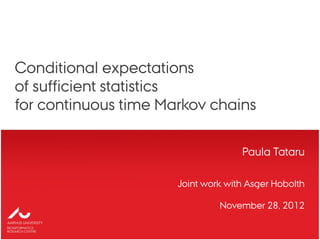PaulaTataru
- 1. Paula Tataru Conditional expectations of sufficient statistics for continuous time Markov chains Joint work with Asger Hobolth November 28, 2012
- 2. Motivation Methods Results Paula Tataru 2/30 Conditional expectations of sufficient statistics for CTMCs Continuous-time Markov chains A stochastic process {X(t) | t âĨ 0} that fulfills the Markov property
- 3. Motivation Methods Results Paula Tataru 3/30 Conditional expectations of sufficient statistics for CTMCs Continuous-time Markov chains âĒ Credit risk âĒ States: different types of ratings âĒ Chemical reactions âĒ States: different states of a molecule âĒ DNA data âĒ States: âĒ Nucleotides âĒ Amino acids âĒ Codons
- 4. Motivation Methods Results Paula Tataru 4/30 Conditional expectations of sufficient statistics for CTMCs Modeling DNA data 1st 2nd base 3rd base T C A G base T TTT Phe TCT Ser TAT Tyr TGT Cys T TTC TCC TAC TGC C TTA Leu TCA TAA Stop TGA Stop A TTG TCG TAG Stop TGG Trp G C CTT CCT Pro CAT His CGT Arg T CTC CCC CAC CGC C CTA CCA CAA Gln CGA A CTG CCG CAG CGG G A ATT Ile ACT Thr AAT Asn AGT Ser T ATC ACC AAC AGC C ATA ACA AAA Lys AGA Arg A ATG Met ACG AAG AGG G G GTT Val GCT Ala GAT Asp GGT Gly T GTC GCC GAC GGC C GTA GCA GAA Glu GGA A GTG GCG GAG GGG G
- 5. Motivation Methods Results Paula Tataru 5/30 Conditional expectations of sufficient statistics for CTMCs Modeling DNA data âĒ Nucleotides (n = 4) âĒ Amino acids (n = 20) âĒ Codons (n = 64)
- 6. Motivation Methods Results Paula Tataru 6/30 Conditional expectations of sufficient statistics for CTMCs Continuous-time Markov chains âĒ Characterized by a rate matrix with properties
- 7. Motivation Methods Results Paula Tataru 7/30 Conditional expectations of sufficient statistics for CTMCs Modeling DNA data âĒ Nucleotides (n = 4) âĒ Jukes Cantor (JC)
- 8. Motivation Methods Results Paula Tataru 8/30 Conditional expectations of sufficient statistics for CTMCs Continuous-time Markov chains âĒ Waiting time is exponentially distributed âĒ Jumps are discretely distributed
- 10. Motivation Methods Results Paula Tataru 10/30 Conditional expectations of sufficient statistics for CTMCs General EM âĒ Full log likelihood âĒ E-step âĒ M-step
- 11. Motivation Methods Results Paula Tataru 11/30 Conditional expectations of sufficient statistics for CTMCs EM for Jukes Cantor âĒ Full log likelihood âĒ M-step
- 12. Motivation Methods Results Paula Tataru Conditional expectations of sufficient statistics for CTMCs 12/30 Calculating expectations
- 13. Motivation Methods Results Paula Tataru Conditional expectations of sufficient statistics for CTMCs 13/30 Linear combinations
- 14. Motivation Methods Results Paula Tataru Conditional expectations of sufficient statistics for CTMCs 14/30 Linear combinations
- 15. Motivation Methods Results Paula Tataru Conditional expectations of sufficient statistics for CTMCs 15/30 Linear combinations
- 16. Motivation Methods Results Paula Tataru Conditional expectations of sufficient statistics for CTMCs 16/30 Methods âĒ In Hobolth&Jensen (2010), three methods are presented to evaluate the necessary statistics âĒ Eigenvalue decomposition (EVD) âĒ Uniformization (UNI) âĒ Exponentiation (EXPM) âĒ Extend efficiently to linear combinations âĒ Which method is more accurate? âĒ Which method is faster?
- 17. Motivation Methods Results Paula Tataru Conditional expectations of sufficient statistics for CTMCs 17/30 Eigenvalue decomposition
- 19. Motivation Methods Results Paula Tataru Conditional expectations of sufficient statistics for CTMCs 19/30 Uniformization âĒ Choose truncation point s(Ξt) âĒ Bound error using the tail of Pois(m+1; Ξt) âĒ s(Ξt) = 4 + 6 âΞt + Ξt
- 21. Motivation Methods Results Paula Tataru Conditional expectations of sufficient statistics for CTMCs 21/30 Algorithms EVD UNI EXPM* 1 A Order 2 J(t) Order 3 (C; t)ÎĢ (C; t)ÎĢ (C; t)ÎĢ Order Influenced by Q , U, UÎ -1 Ξ, s(Ξt), R O(n3 ) O(n2 ) O(n2 ) Rm eAt O(n2 ) O(s(Ξt)n3 ) O(n3 ) O(n3 ) O(s(Ξt)n2 ) O(n2 ) Ξt â * expm package in R
- 22. Motivation Methods Results Paula Tataru Conditional expectations of sufficient statistics for CTMCs 22/30 Accuracy âĒ Use two models for which â(C; t) is available in analytical form âĒ JC, varying n âĒ HKY, varying t âĒ Measure accuracy as the normalized difference: approximation / true - 1 âĒ as a function of n âĒ as a function of t
- 24. Motivation Methods Results Paula Tataru Conditional expectations of sufficient statistics for CTMCs 24/30 Speed EVD UNI EXPM* 1 A Order 2 J(t) Order 3 (C; t)ÎĢ (C; t)ÎĢ (C; t)ÎĢ Order Influenced by Q , U, UÎ -1 Ξ, s(Ξt), R O(n3 ) O(n2 ) O(n2 ) Rm eAt O(n2 ) O(s(Ξt)n3 ) O(n3 ) O(n3 ) O(s(Ξt)n2 ) O(n2 ) Ξt â
- 25. Motivation Methods Results Paula Tataru Conditional expectations of sufficient statistics for CTMCs 25/30 Speed âĒ Partition of computation âĒ Precomputation âĒ EVD âĒ UNI âĒ Main computation âĒ Use three models and different time points to asses the speed âĒ GY, n = 61 âĒ GTR, n = 4 âĒ UNR, n = 4
- 26. Motivation Methods Results Paula Tataru Conditional expectations of sufficient statistics for CTMCs 26/30 Speed âĒ 10 equidistant time points
- 28. Motivation Methods Results Paula Tataru Conditional expectations of sufficient statistics for CTMCs 28/30 Results âĒ Accuracy âĒ Similar accuracy âĒ EXPM is the most accurate one âĒ Speed âĒ EXPM is the slowest âĒ EVD vs UNI
- 29. Motivation Methods Results Paula Tataru Conditional expectations of sufficient statistics for CTMCs 29/30 Results âĒ UNI has potential âĒ Better cut off point s(Ξt) âĒ Ameliorate effect of Ξt by âĒ Adaptive uniformization âĒ On-the-fly variant of adaptive uniformization
- 30. Thank you! Comparison of methods for calculating conditional expectations of sufficient statistics for continuous time Markov chains BMC Bioinformatics 12(1):465, 2011
































































